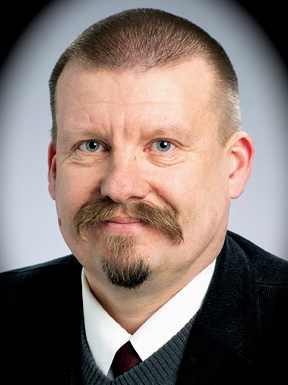Kjell Lemström to be new Head of Studies
Since Jaakko Kurhila left the department to head the Open University, we had to find a new university lecturer to act as head of studies in short order. We received a total of 28 applications. Out of these, and after a preliminary qualification round, evaluations, interviews, and a department council hearing, Kjell Lemström (KL) was elected for the post. He started working as the department's Head of Studies on 2 March 2015, so the Head of the department (JP) conducted the following induction interview that very week.
This is by no means the first time Kjell has been employed by the department. He defended his thesis on ‘String Matching Techniques for Music Retrieval’ in 2000, and has held numerous teaching and research positions both before and after that, until he transferred to the Laurea University of Applied Sciences in 2011 (luckily, that was only temporary).
JP: What have you been doing the past few years?
KL: I transferred from the department to Laurea in autumn 2011 to become head teacher in computer science. After that my duties changed a few times, partly due to licensing and organisational changes at Laurea: in spring 2012, I became the director of development in charge of research, development and innovations at the Kerava unit; in autumn 2012, I became the director of development for the computer science and tourism programmes; and at the beginning of 2015 moved to the new RDI unit. So the past few years, I have not been teaching at all, but rather planning it and organising various development projects at Laurea.
JP: Why did you apply for the post as head of studies at the department?
KL: First of all, I’d say because the post was interesting, and I’d been interested in it before. In addition, I can carry out research at the department, which was not possible in a university of applied science. The third thing is, my recently changed duties at Laurea made it easy to leave.
JP: What are the things you will focus on as head of studies?
KL: I think I should continue on the path Jaakko took before me, and try to remove any hurdles in the way of studies and their progress. In addition, I will try to influence the elements of the funding model of the Ministry of Culture and Education so that their values become more beneficial for the department.
JP: You have been employed both at a university and a university of applied sciences. How do these two differ from each other?
KL: The biggest difference is the scientific research carried out at universities, but not in universities of applied sciences. Another significant difference is that UASs are legally required to serve local area development when it comes to such things as study options, for instance.
JP: What does teaching at the department look like to an ‘outsider,’ and how can we still improve it?
KL: In the past few days, I haven’t been able to form a more profound opinion yet, but in general the situation is very good, and that is well known. The most important thing is to keep on keeping on the good flow. I have discovered one potential problem, though: as the “structural” staff plan for the department states that lecturers retiring in the near future will be replaced with professors and assistant professors, how will we have to reorganise our teaching in order to ensure that the volume and quality of our teaching remains the same?
JP: Do you have any hobbies?
KL: My main hobby is sports, and especially cycling; in June, for example, I’m participating in a mass event, cycling some 300 kilometres around Lake Vättern. In addition, I dabble in classical music, primarily singing in a chamber choir.
JP: Do you have an elated ‘inauguration speech’?
KL: ‘I will make my own way.’

